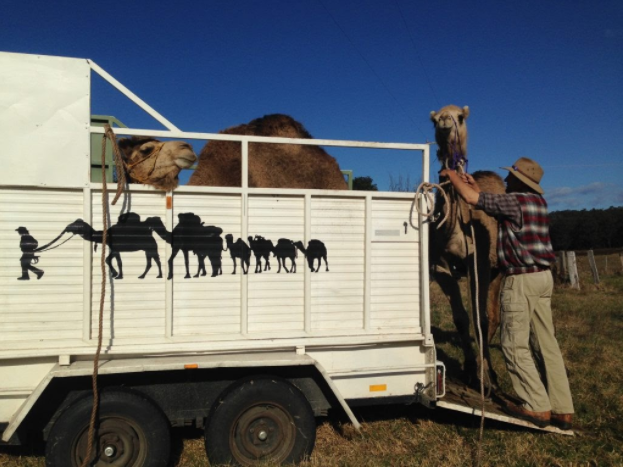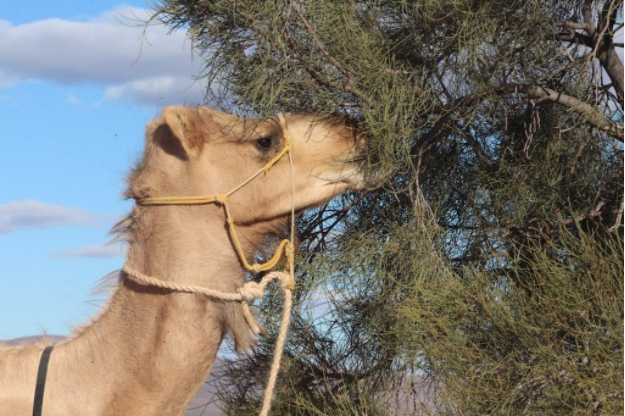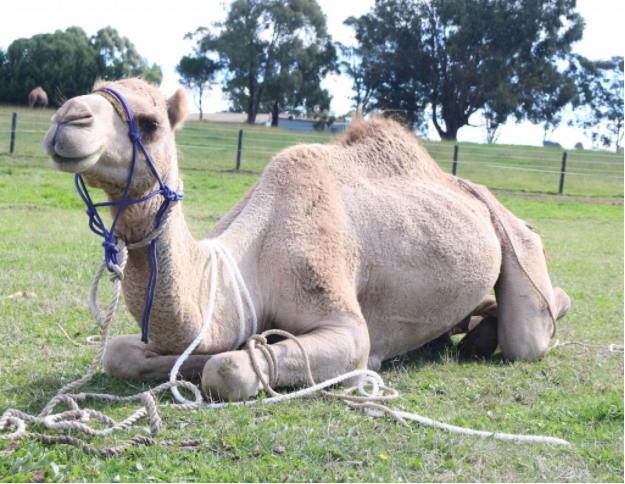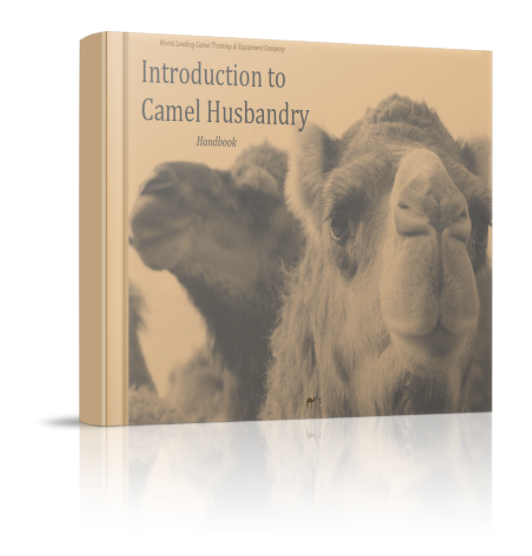7 Helpful Tips for Camel Care and Camel Husbandry
Sep 10, 20217 Helpful Tips for Camel Care and Camel Husbandry
Being a camel owner can be a nervous time, questions can linger and the Google search begins: How to Care for a Camel. Unfortunately there isn’t much information available on the World Wide Web about camel care, camel training or camel husbandry, which can make you wonder if you’re even getting the right information in the first place!?
The camel, being an exotic animal, can be more of a challenge to get feeding right alongside any western medical needs, holistic care and training than any other animal you have experienced.
In short, a camel cannot be treated like any other animal. They are complex creatures emotionally and physically, especially their biology. A camel owner is always learning, unfortunately it’s often trial and error, which brings us to why we wanted to write and share these camel care and camel husbandry tips with you which are extracts from our Camel Husbandry eBook.
We have learnt this camel care information over many years and think it’s only fair that the information that we’ve learnt is shared with other caring and like minded camel owners or those considering of bringing camels into their lives.
#1 Most common mistake made is camels being cared for the same as other animals are cared for. Camel’s are unique in biology and behaviour and must be cared for accordingly.
In the western world, veterinarians often lack the research and experience of camels welfare and health. Vets often work with the camel owner’s knowledge to work out what is best for the camel and again, it can be a trail and error circumstances between professional and camel owner. All camel owners need to keep an open mind on camel welfare, knowledge and learning.
As a camel owner you must acquire a mindset of openness to new information. There is a lot of camel information offered if one asks, but not all of it is good, accurate information. It’s important to do your research and remain open minded.
Here we will cover basic camel care, what to look out for, how to diagnose, feeding, prevention before the cure, and husbandry methods.
Tip# 1 – Replicating Their Natural Habitat
We know for a fact that most of us don’t live in desert environments, which is a call for any camel owner to get thinking on replicating the camel’s original environment (the desert). It’s important to try to re-create this as best as you can in a camel’s domestic environment with you.
Think, what the camel would be eating? The change of season and the bushes and herbs available to them for self-medication? The environment? And so forth. A camel that is often in a very wet environment will need some serious man-made adjustments to their environment in order to keep the camel stress free and healthy.
We explain this in more detail in our Introduction to Camel Husbandry eBook.
Tip #2 Limiting a Camel’s Exposure to Stress
Camels are highly sensitive creatures. When a camel is unwell it's very likely that they have been unwell for a few month or even years prior to them showing symptoms. Helping a camel come back to good health and can take if not years.
The unique thing about camels is that they are survival animals and they won't shows signs of illness straight away if there is an imbalance in their health. Their underlaying health issues have been present for many months prior. This is why a camel owner should know their camel well through handling, training, connection & trust
If a camel falls ill they will go ‘down hill’ quickly, it’s important that as a camel owner that you learn to read early signs of potential health hazards – which comes in time and having a good camel mentor and camel vet to contact if needed.
The easiest way to keep a camel from illness and health issues is prevention before the cure!
Camels are hardy animals,that is, in their perfect desert environment, but once they are removed from their ‘camel heaven’ and domesticated more hands on approach to their care is needed.
A camel stress is a major factor to consider in a camel health as one stress on the body (hence immune system) can lead to another. Stress will lower the immune system response, which can evolve into bigger issues down the track.
It’s not always easy to tell if a camel is stressed (especially if it’s internal. sometimes that doesn’t show up until weeks / months later when it might be too late), so we’ve created a short list below on some camel stress related issues to look out for and consider. Consider all the information below careful for your camel’s current, domesticated environment.
Below is a shortlist of stresses in a camel’s domesticated environment:
Environmental Stress and Illness
Training and Handling Stress
Separation Stress
Lactation
Parasites
Work Load
Imbalanced Camel Diet
The above stress indicators are explained in full detail in our Introduction to Camel Husbandry eBook
Tip #3 Transporting Your Camel
One of the most common questions we get it how to transport a camel(s). You might be surprised to hear that the answer really depends on the size of the camel. For young camels aged from 2 – 4 (even 5 or 6) years old, most likely can be transported in double horse float or something of equitant size.
This really is size dependent though. Before choosing a mode of transport for your camel, measure heights if the camel is above 4 years old. A large trailer or even a truck might be necessary. If transporting camels in large numbers, a large truck will be in order. It’s important that any hired help have camel experience.
Camel’s do not and will not respond to be treated like cattle. The process can be less stressful for the animals and less frustrating for transporter if experience is at hand. Loading a camel (for the first time) should be done under the mentorship of experienced camel handlers unless the camel is experienced. It can be a frustrating, stressful and sometimes unsuccessful endeavor otherwise.
For long hauls certain camel specific supplements are recommended.
When a camel travels they like to sit down once the vehicle begins to move. During the travel they will freely stand and sit at their own leisure (unless the camel is tied down).

Tip #4 Parasites in Camels (De-Worming Camels)
Prevention before the cure is a good rule of thump to follow when it comes to managing parasites in camels. Keeping up the mineral content in the camels bodies to maintain balance is essential as natural minerals such as copper will help keep parasites at bay, but if the camel has already got parasites copper will not help rid them.
Stress [from parasites] can decease immune response to parasites in the body, and often result in weight loss and potential life treating diseases, hence prevention before the cure where possible.
ALWAYS request a fecal egg count from your local vet BEFORE de-worming, if not done so you're flushing money down the drain not knowing what parasites your camel has and therefore not addressing them with the correct de-wormer.
Worming of your camel is a subject whereby common sense needs to prevail. If you are living in a worm-habituated region, putting your camel onto a regular worming program is wise, we recommend one in our Camel Husbandry eBook.
This complex subject alongside camel de-wormers is explained in more details in the Camel Husbandry eBook
Tip #5 What Does (or should) a Camel Eat and How Much?
Camels are in the Camelid family and are pseudo ruminates having a 3 chambered stomach. Camels ruminate their food – meaning they eat food, regurgitate it and chew again, often called ‘chewing their cud’. This is why more often than not see camels chewing regularly. Although camels ruminate, they are not true ruminants, as they lack the four well-defined stomachs of the ruminants. A camel only has three of the four ruminate stomachs.
Camels are browsers by nature, with a split upper lip well suited to this purpose. They are normally selective feeders and eat the freshest vegetation available.
In a study carried out by Doerges and Heuckes, on Newhaven station, Australia, they observed the Camels ate 81.5% of the available plant species. Grasses are eaten primarily after rain, and before herbs and phorbs are available. Wild Camels are mobile feeders and frequent remote salt lakes where plants high in electrolyte and moisture are present.

Domesticated camels need a diet high in bulk. They are quite adaptable to the gradual introduction of supplementary (e.g. hay) food to their diets. In the wild, or feral state they search for plants high in salts. In a domestic situation access to losses salt essential.
The camel browses or grazes for 8 hours each day and will take another 6 to 8 hours to chew the cud.
The camel can eat sharp, thorny plants which other animals cannot eat. Camels can reach branches of trees and bushes to a height of 3 meters. The camel eats these woody plants by using its strong canine (dog) teeth to crush the wood – often if a camel is de-barking a tree it can mean they are low in copper. Recommend feed and ratios are explained further in the Camel Husbandry eBook.
Tip #6 A Camel’s Diet, Part 2, Salt Intake
Camels need pure rock salt in their diet. The reason being is because it’s regularly lost in their urine and researches have measured that an adult camel will consume anywhere from 120 – 150g of salt per day to compensate.
Salt is very important for the camel. A camel needs eight times as much salt as do cattle and sheep.
A camel needs about 1kg of salt a week in their diet, whether that is through plants or loose rock salt. Go to your local pool shop or hardware store and get a bag of loose (pool) 100% salt - no additives. Keep it in their paddock (in a feeder/bucket) so they can help themselves. If you find your camel is eating a lot of salt, do not worry, they need it and will regulate it themselves. Make sure salt is always available.
A Word on Salt Blocks: Camels do not have long enough tongues to lick salt blocks nor can they get their daily requirements from such things, therefore they will begin to chew the blocks which in turn can cause premature teeth wearing and eventually they won’t be able to eat food and they will die at a younger age due to starvation. Loose salt is best. Another reason we suggest loose salt is that camels can form, what veterinarians call, Compulsive Licking Syndrome, because of the fact that a camel would have to compulsively lick the block in order to get their daily dose of salt.
Tip #7 Non-Emergency Camel First Aid
Like any animal, no doubt, the camel will require some camel first aid in their lifetime. As camel owners it’s up to us to do everything we can to prevent such things, but the reality is that sometimes it just happens. Below is a shortlist of some common camel first aid issues amongst camel owners. Each subject is explained in full with recommendations in the Camel Husbandry eBook.
Wounds & Abrasions
Abscesses
Diarrhea / Scouring
Underweight Camels
Muscular Issues
Gelding/Castration of Bulls
A 5yo bull camel prepared for castration with front and back leg tie downs.
We (Russell & Tara) have been involved with camels, camel care and camel training for a combined 20+ years. There has been our fair share of heart break with camel deaths and unresolved illness – something’s unexplainable and undiagnosed. We’ve gained more knowledge on caring for camels and learnt the early signs of, very common, camel dietary, camel medical and camel husbandry issues. We’ve lived in the Australian outback (desert) with camels, we’ve lived on greener coastal pastures with camels and also in tropical locations, each time finding out what works and what doesn’t work when it comes to caring for camels.
If you’re reading this you are probably a proud camel owner or considering brining camels into your life, either way, you will face your challenges of camel husbandry and camel welfare, but the good news is that you can do the right thing by your camel by getting a copy of our detailed Introduction to Camel Husbandry eBook.
The writings in this Introduction to Camel Husbandry book are in Layman terms, easy to understand and, most importantly, easy to implement.
This is a non-medical book and that gives the basic knowledge and understand of a camels needs based off our experiences as owing camels in a range of different environments from Australian deserts to coast lands.
Topics Covered in our Introduction to Camel Husbandry eBook:
About The Camel
Camel Stress
– Physical Indicators
– Early Signs of Camel Stress
– Environmental Stress & Illness
– Training and Handling
– Separation Stress
– Lactation
– Parasites
– Workload
– Diet
Purchasing Camels, Which Camel is Right for you?
Bringing Your Camel Home
– Paddocks and Fencing
– Shelter
– Transporting Your Camel
Camel Diseases
Parasite Control
– Suggested Management Plan
– Parasitic Symptoms
Insects
Camels Diet
– Camel Food and Ratios
– Minerals
– Weed / Favourable Foods
– Salt Intake
– Mineral Deficiency Symptoms
– Water
Non Emergency First Aid
– Wounds and Abrasions
– Abscesses
– Diarrhea / Scouring
– Underweight Camels
– Weight Gain Recipe
– Muscular Issues
– Slow Improvers
– Gelding / Castration of Bulls
Camel First Aid Kit
Camel Equipment
– Nose Pegs
– Camel Halters
– Camel Hobbles
– Camel Saddles
– Camel Harness
The perfect place to start for new camels owners, those considering owning camels and even those that have had camels for sometime and want to add to their knowledge on How to Care for Camels.
Camel Husbandry eBook Must Have Book for Camel Owners!
Lorem ipsum dolor sit amet, consectetur adipiscing elit. Cras sed sapien quam. Sed dapibus est id enim facilisis, at posuere turpis adipiscing. Quisque sit amet dui dui.
Stay connected with news and updates!
Join our mailing list to receive the latest news and updates from our team.
Don't worry, your information will not be shared.
We hate SPAM. We will never sell your information, for any reason.





